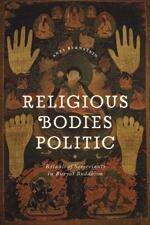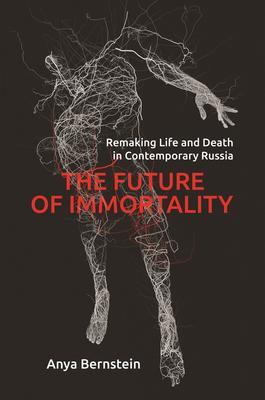Anya Bernstein

Research and Teaching Interests
Climate change, science and technology, religion and secularism, death and immortality, the body, time and temporality, visual ethnography; Russia, Inner Asia, Siberia, the Arctic.
Anya Bernstein’s first book, Religious Bodies Politic: Rituals of Sovereignty in Buryat Buddhism (University of Chicago Press 2013), explored the transformation of Buddhist practice among a Siberian indigenous people known as Buryats, foremost through their post-Soviet renewal of transnational ties with their fellow co-religionists across north and south Asia. To capture these issues ethnographically, Bernstein conducted multi-sited field research in Buryat communities in Siberia as well as in Tibetan monasteries in India where some Buryat monks currently receive their religious education. The book focused on the ways in which religion and politics have intersected under conditions of rapid social change in terms raised by recent work on sovereignty and postsocialism that focused on the body. Bernstein investigates cases of emblematic bodies—dead bodies of famous monks, temporary bodies of reincarnated lamas, ascetic and celibate bodies of Buddhist monastics, and dismembered bodies of lay disciples given as imaginary gifts to spirits—that became key sites through which Buryats conformed to and challenged Russian political rule.
Religious Bodies Politic was winner of the Award for Excellence in the Study of Religion from the American Academy of Religion in 2014; and an Honorable Mention for the Davis Center Book Prize in Political and Social Studies from ASEEES, the Association for Slavic, East European, and Eurasian Studies, the same year.
Her second book, The Future of Immortality: Remaking Life and Death in Contemporary Russia (Princeton University Press 2019), explores how, from the mid-nineteenth century onward in Russia, the Soviet Union, and now the Russian Federation, an uncommonly wide range of actors has pursued the dream of achieving human immortality. Beginning with a long line of Russian philosophers, to the experiments of Soviet-era scientists, and with global implications felt today in Silicon Valley and beyond, the conjunctions of body, mind, and being have been in steady motion, pressing at the very limits of death itself. In a rich ethnography that traverses contemporary Russian culture and politics, Bernstein documents these remarkable technoscientific and religious futurisms. She traces the complex roots of this phenomenon in particular histories of visionary social and biological engineering, space exploration, Soviet philosophies of time, and shifting narratives of the human condition produced by scientific and technological advances in the twentieth century and today. From the titans of Russian tech firms to the owners of a smaller-scale cryonics outfit and their clients, alongside Russian Orthodox followers of the charismatic thinker Nikolai Fedorov, academic scientists in the field of biogerontology, and grassroots neurotechnology enthusiasts, Bernstein carefully explores what is at stake in such pursuits. What do they portend for the very idea of the human?
Bernstein is currently working on her third book, Pleistocene Park: Extinction and Eternity in the Russian Arctic (under contract with Princeton University Press). The next stop on Bernstein’s quest to understand how life, death, nature, and time are being remade, the book chronicles the efforts of a transnational team of scientists to “resurrect” an extinct ecosystem in Arctic Siberia in an effort to slow down the melting of permafrost. Pleistocene Park, along with the related but independent American enterprise of de-extinction, provides us with an ideal lens for closely examining these issues. Since 2018, Bernstein has been following the park’s key figures on expeditions transporting bison from Europe to the Arctic, crossing the vast Eurasian distances and the Arctic in a combination of animal trucks, speedboats, and barges. Together they have found bones left from the Ice Age lying exposed in shifting permafrost slumps caused by thawing, and they have traversed layers of geological time in underground permafrost tunnels. This book, addressed to the general public, follows Bernstein’s travels from the Russian Arctic to the heart of the US biotechnology scene, from permafrost slumps in northern Siberia to a futurist biolab in Boston equipped with the latest in genetic-engineering technology. Her first article from this project is forthcoming in Critical Inquiry in the spring 2024.
Bernstein is also one of the two PIs on Human Futures: A Study of Technoscientific Immortality, an international collaborative research project funded by the Research Council of Norway.
Bernstein also published widely on the issues of religion, secularism, art and censorship in contemporary Russia, particularly on the moral dilemmas that have animated passions behind recent post-Soviet culture wars, such as the conflicts between contemporary artists, the Russian Orthodox Church, and society at large. She also published on the battles over religious relics, issues of end-of-life care, and shamanism in Russia.
As a visual anthropologist, Bernstein has directed, filmed, and produced several award-winning documentary films on Buryat Buddhism and shamanism, including Join Me in Shambhala (2002) and In Pursuit of the Siberian Shaman (2006).
Bernstein’s work has been generously supported by a number of external research and writing fellowships, including National Science Foundation, Fulbright, Social Science Research Council, The Research Council of Norway, and Wenner-Gren Foundation research grants, National Endowment for the Humanities, Mellon/American Councils of Learned Societies, Luce/ACLS, and Alfred P. Sloan Foundation writing fellowships, Michigan Society of Fellows Postdoctoral Fellowship, and Social Science Research Council Fellowship for Transregional Research. Her articles have appeared in Critical Inquiry, Journal of the Royal Anthropological Institute, American Ethnologist, American Anthropologist, Cultural Anthropology, Comparative Studies in Society and History, Public Culture, Anthropology Today, Ab Imperio: Studies of New Imperial History and Nationalism in Post-Soviet Space, Inner Asia, Sibirica: Journal for Siberian Studies, and Mongolian Studies. Bernstein’s films have been screened at film festivals around the world and are widely used in university classrooms for courses on anthropology of religion, globalization, tourism, Asian and Russian studies, and indigenous societies.
Bernstein holds a BS in Linguistics from Georgetown University, an MA in Visual Anthropology from the University of Manchester, and a PhD in Anthropology from New York University. From 2010 to 2012 she was a Postdoctoral Fellow at the Michigan Society of Fellows.
Recent Media Appearances:
"Thinking Allowed" - BBC Radio 4
“On My Radar: Karl Ove Knausgaard’s Cultural Highlights” - The Guardian/Sunday Observer
“Immortality and Transhumanism in Russia” - Sean’s Russia Blog Podcast
V-A-C Foundation (Italy and Russia) in English, and in Russian.
“Russian Immortalists with Points to Prove” - Archipelago Podcast (Greece)
See Also:
Contact Information
21 Divinity Avenue
Cambridge, MA 02138


